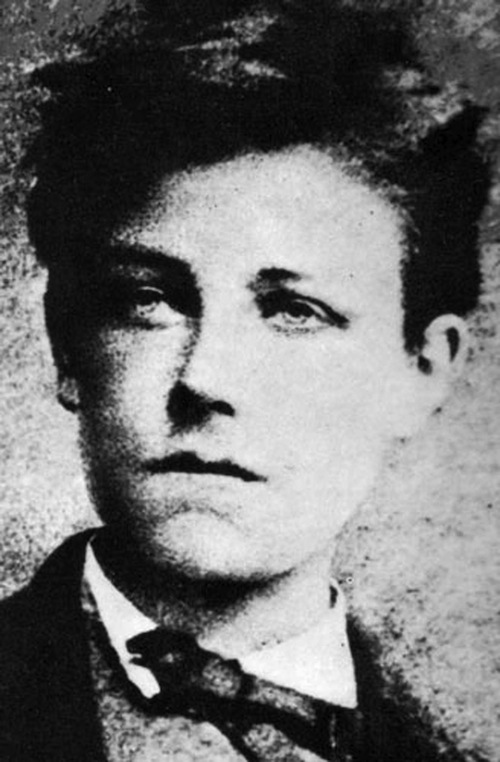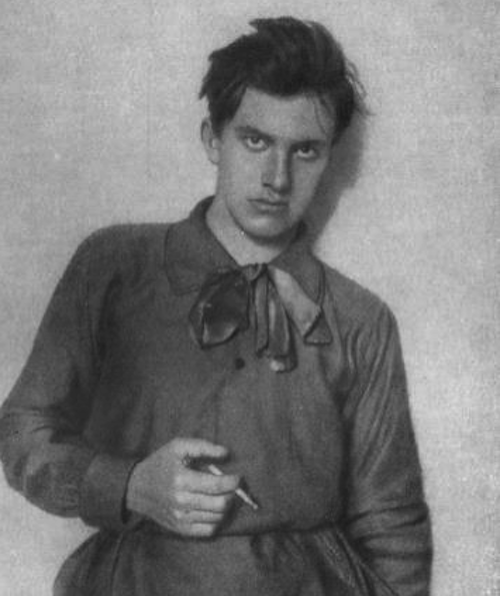The eleventh hour
fleeting
as if it’s your
hand I’m holding
for Stacy Doris
I look up from reading. Sun. A bird lands on the roof of the building opposite.
Side-tracks, deviations—the dérive? [meaning “drift,” the topos, the “urban drift” of the Situationists, cf The Beach Beneath The Street, McKenzie Wark, Verso 2011]
Incompleteness: flashes of light. “The tag is everything….” [Iain Sinclair, Lights Out for the Territory. Granta Books 1998] Or is it not?

Rimbaud, age 17, photo by Étienne Carjat
Going back to the dérive in Rimbaud’s “Le Bateau ivre” where, in Paul Schmidt’s fantastic translation [Arthur Rimbaud, Complete Works. Translated from the French by Paul Schmidt. Harper Colophon 1976; Perennial Classics 2000] the poem starts with
I drifted on a river I could not control.
In the other of my most favorite translations, Samuel Beckett begins with
Downstream on impassive rivers suddenly.
Two magnificent and very different first lines, but rhythmically not that far apart. The thing is, the word dérive does not appear anywhere in the poem.
Next stanza, last line. Schmidt has
I forgot about everything and drifted on.
Beckett:
I made my own course down the passive rivers.
Where Schmidt uses forms of drift and Beckett has chosen passive and rivers, the French poem has forms of the verb descendre (to descend, come down, go down, as in a river flowing down into the sea).
The words are all different.
Leap of faith.
Transcendence or encounter.
A record of the encounter. “What is hidden and common to both.
“Nines and Tens: a Talk on Translation”
Norma Cole, To Be At Music
Further on, at the heart of the poem, there are six stanzas each beginning with “I” –the “Je” of “JE est un autre,” the famous “I is an other” [from Rimbaud’s letter of 13 May, 1871 to Georges Izambard, his former teacher, who found this letter again in 1911 and published it in 1926].
I watched the lightning tear the sky apart
…
I saw the sun with mystic horrors darken
…
I dreamed of green nights and glittering snow
…
For months I watched the surge of the sea
…
I have jostled—you know—unbelievable Floridas
…
In stinking swamps I have seen great hulks
(Schmidt)
I know the heavens split with lightning
…
I have seen, as shed by ancient tragic footlights
…
I have dreamt the green night’s drifts of dazzling snow
…
I have followed months long the maddened herd of the surf
…
I have fouled, let it be known, unspeakable Floridas
…
I have see Leviathan sprawl rotting in the reeds
(Beckett)
*
I watched the lightning tear the sky apart,
Watched the waterspouts, and streaming undertow,
And Dawn like Dove-People rising on wings—
I’ve seen what men have only dreamed they saw!
(Schmidt)
Let it be known that I do not read these lines without thinking of Batty, a replicant, played by Rutger Hauer, from his last speech in Blade Runner, 1982 release:
I’ve seen things you people wouldn’t believe. Attack ships on fire off the shoulder of Orion. I watched c-beams glitter in the dark near the Tanhauser Gate. All those… moment will be lost… in time.
And let it be known that then I cannot but think of Whitman’s “Reconciliation,” in Drum Taps, published in 1865 as a separate book of 53 poems, then, with 18 more poems, folded into Leaves of Grass.
Word over all, beautiful as the sky!
Beautiful that war and all its deeds of carnage must in time be utterly lost;
This triangulation/translation appearing in my mind (and others’ minds?) belongs to the social/cultural/political and singular way one reads or views, over time, and stores stuff for an afterlife that is “now.”
*
Going back to “Le Bateau ivre,” and the “talk” to which I referred with my “Leap of faith” etc.—this essay, “Nines and Tens,” begins with thoughts of Beckett’s incredible leap of imagination. In Rimbaud’s fourth stanza, the boat floats on for “dix nuits,” count’em, ten nights. But there’s a screaming internal rhyme provoked in “dix nuits,” pronounced “dee nuwee.” Eeeee! So Beckett changes the number from ten to nine. Cheeky bastard! (And changes the phrasing around too.) He begins with the “I” and then the next line “Nine nights” and then in the fourth line, there’s the “eye” again. But doth suffer a sea-change / Into something rich and strange.[Ariel’s song, from Shakespeare’s The Tempest]
La tempête a béni mes éveils maritimes.
Plus léger qu’un bouchon j’ai dansé sur les flots
Qu’on appelle rouleurs éternels de victimes,
Dix nuits, sans regretter l’oeil niais des falots.I started awake to tempestuous hallowings.
Nine nights I danced like a cork on the billows, I danced
On the breakers, sacrificial, for ever and ever,
And the crass eye of the lanterns was expunged.
Once that was in print, what could you do? Cinematic Paul Schmidt does “day” for “night.” Ten days….
*
It’s starting to rain. I begin to think again about Mayakovsky’s great poem, “A Cloud in Trousers.” Or would it be “A Cloud in Pants”?
In the meantime, I’m rereading Frank O’Hara’s “Mayakovsky”!
I love you. I love you,
but I’m turning to my verses

Vladimir Mayakovsky 1893-1930
Norma Cole is a poet, painter, and translator. She was born in Toronto, Canada, and attended the University...
Read Full Biography

